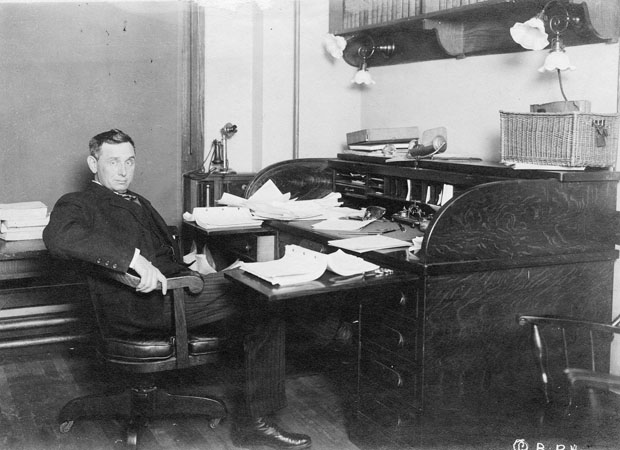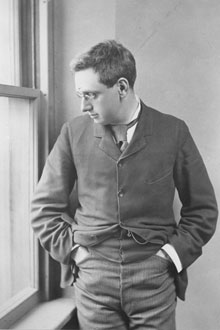To be let alone: Brandeis foresaw privacy problems
What would the privacy-law champion make of surveillance programs like PRISM?

Louis Brandeis at his desk

Louis Brandeis looks out his office window, circa 1890
“Recent inventions and business methods call attention to the next step which must be taken for the protection of the person, and for securing to the individual … the right ‘to be let alone’ … Numerous mechanical devices threaten to make good the prediction that ‘what is whispered in the closet shall be proclaimed from the house-tops.’”
Could be an op-ed in The Wall Street Journal or The Boston Globe about the National Security Agency’s (NSA) secret surveillance programs, right?
Wrong.
A 34-year-old Boston lawyer named Louis Brandeis wrote these words 26 years before he would join the Supreme Court. The invention he referred to is the portable camera and the business methods, celebrity journalism.
Brandeis and his law partner Samuel Warren published “The Right to Privacy” in the Harvard Law Review in 1890, where it became the first major article to advocate for a legal right to privacy.
Nearly 30 years later, in 1928, with the popularization of the telephone and the invention of wiretapping, Supreme Court Justice Brandeis argued for a constitutional right to privacy in a dissenting opinion in Olmstead v. United States.
Today, technology and privacy are at another crossroads. When former NSA contractor Edward Snowden recently revealed the security agency conducts dragnet surveillance of the phone and Internet records of millions of Americans, he reignited the debate about a citizen’s right to privacy.
“First as an attorney, then as a jurist, Brandeis was the single most import figure in the history of the concept of privacy,” says Steve Whitfield, the Max Richter Professor of American Civilization.
Brandeis became the first justice to interpret a constitutional right to privacy in the Fourth Amendment, Whitfield says. He was also the first jurist to recognize the threat technology posed to citizens.
“The progress of science in furnishing the Government with means of espionage is not likely to stop with wiretapping,” Brandeis wrote in Olmstead, a case in which the government illegally wiretapped the conversations of a suspected bootlegger. “Ways may someday be developed by which the Government, without removing papers from secret drawers, can reproduce them in court, and by which it will be enabled to expose to a jury the most intimate occurrences of the home.”
Today, Brandeis’ words sound prophetic.
“Brandeis was ahead of his time in his awareness of the role technology played in evolving legal standards,” explains President Frederick Lawrence, a noted legal scholar specializing in First Amendment issues.
It’s difficult to speculate how Brandeis would respond to the NSA’s massive electronic data mining program, known as PRISM. On one hand, Brandeis would want to protect citizens from intrusion. “He would be concerned about the accumulation of data that might be used to compromise individual privacy,” Lawrence says.
On the other hand, Brandeis might have difficulty reconciling privacy and security. “Brandeis could not have anticipated the right of privacy would be pitted against national security and the challenge of terrorism,” Whitfield says. ”The stakes are considerably higher today than in Brandeis’ time.”
Also, the expectation of privacy has changed since Brandeis’ era, Lawrence notes, thanks to Facebook, Foursquare, Twitter and other social media sites. Today, many people voluntarily and actively give up their right “to be let alone.”
“He would have a hard time in the Internet age, where there is nothing but information and no separation between your life and someone else’s,” says Dan Breen, a senior lecturer in legal studies.
What is certain, however, is that Brandeis would have welcomed a robust debate about privacy in the digital age, says Breen. “Brandeis believed in the value of experience. He would think that a genuine debate would be the best way to handle this situation.”
About Brandeis University
As a top-tier private research university with a focus on the liberal arts, Brandeis University is dedicated to teaching and mentorship of undergraduate and graduate students, engaging them meaningfully in the groundbreaking research of our faculty.
Founded by the American Jewish community in 1948 as a nonsectarian institution at a time when exclusionary practices prevented equal access to some of the nation’s best universities, Brandeis has always welcomed talented students and faculty of every ethnicity, religion and cultural background.
Our 235-acre campus is located in Waltham, Massachusetts, in the suburbs of Boston, a global hub for higher education and innovation.
Categories: General, Humanities and Social Sciences, International Affairs





